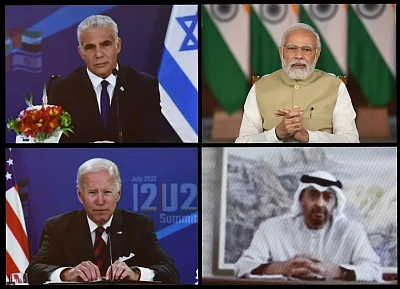As the leaders of India, Israel, the United Arab Emirates (UAE), and the United States convened for the first leaders' meeting of the I2U2 grouping, the nations came together to focus on joint investments and new initiatives in water, energy, transportation, space, health, and food security.
The countries released a joint statement in which they said they plan to "mobilise their respective private sector capital and expertise in order to modernise infrastructure, advance low carbon development pathways for industries, improve public health and access to vaccines, and advance physical connectivity between countries in the Middle East region."
The four-nation virtual summit was attended by Indian Prime Minister Narendra Modi, UAE President Sheikh Mohammed Bin Zayed Al Nahyan, US President Joe Biden, and Israel Prime Minister Yair Lapid.
The focus was on coming up with joint financing opportunities and establishing connections between start-ups and I2U2 investments. Moreover, they plan to promote the development of critical emerging and green technologies.
India expressed its interest in collaborating with the US, UAE, and Israel as a member of the Agriculture Innovation Mission for Climate initiative (AIM Climate).
"These are only the first steps in a long-term strategic partnership to promote initiatives and investments that improve the movement of people and goods across hemispheres, and increase sustainability and resilience through collaborative science and technology partnerships."I2U2 leaders in a joint statement by the White House
The I2U2 leaders highlighted various initiatives under the umbrella of food security and clean energy, apart from committing to advancing the economy with higher investments in the private sector.
Clean Energy
The I2U2 grouping plans to create a hybrid renewable energy project in Gujarat, India, which would consist of 300 megawatts (MW) of wind and solar capacity along with a battery energy storage system.
According to the statement, India plans to achieve 500 GW of non-fossil fuel capacity by 2030.
With the help of such projects, India is likely to become a global hub for alternate supply chains in the renewable energy sector.
Food Security
The UAE plans to invest $2 billion in order to develop food parks across India, which will have smart climate technologies enabling the parks to reduce food waste and spoilage, conserve fresh water, and utilise renewable energy sources.
India will do its part in providing suitable land for the project and facilitating farmers' integration into the food parks.
These investments are designed to enable the maximisation of crop yields and, thus, tackle food insecurity in South Asia and the Middle East.
(At The Quint, we question everything. Play an active role in shaping our journalism by becoming a member today.)
